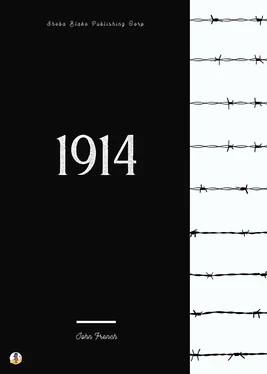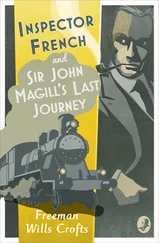About the middle of November, 1914—after three and a half months of war—we were fairly settled down to the war of positions.
It was, therefore, in a somewhat troubled frame of mind that I began to play my humble part in this tremendous episode in the history of the world. The new lessons had to be learned in a hard school and through a bitter experience. However, for good or for evil, I have always been possessed of a sanguine temperament. No one, I felt, had really been able to gauge the respective fighting values of the French and German Armies. I hoped for the best and rather believed in it; and in this confident spirit, although anxious and watchful, I landed at Boulogne at 5 p.m. on August 14th, 1914.
It will be a fitting close to this chapter if I add the instructions which I received from His Majesty’s Government before leaving.
“Owing to the infringement of the neutrality of Belgium by Germany, and in furtherance of the Entente which exists between this country and France, His Majesty’s Government has decided, at the request of the French Government, to send an Expeditionary Force to France and to entrust the command of the troops to yourself.
“The special motive of the Force under your control is to support and co-operate with the French Army against our common enemies. The peculiar task laid upon you is to assist the French Government in preventing or repelling the invasion by Germany of French and Belgian territory and eventually to restore the neutrality of Belgium, on behalf of which, as guaranteed by treaty, Belgium has appealed to the French and to ourselves.
“These are the reasons which have induced His Majesty’s Government to declare war, and these reasons constitute the primary objective you have before you.
“The place of your assembly, according to present arrangements, is Amiens, and during the assembly of your troops you will have every opportunity for discussing with the Commander-in-Chief of the French Army, the military position in general and the special part which your Force is able and adapted to play. It must be recognised from the outset that the numerical strength of the British Force and its contingent reinforcement is strictly limited, and with this consideration kept steadily in view it will be obvious that the greatest care must be exercised towards a minimum of losses and wastage.
“Therefore, while every effort must be made to coincide most sympathetically with the plans and wishes of our Ally, the gravest consideration will devolve upon you as to participation in forward movements where large bodies of French troops are not engaged and where your Force may be unduly exposed to attack. Should a contingency of this sort be contemplated, I look to you to inform me fully and give me time to communicate to you any decision to which His Majesty’s Government may come in the matter. In this connection I wish you distinctly to understand that your command is an entirely independent one, and that you will in no case come in any sense under the orders of any Allied General.
“In minor operations you should be careful that your subordinates understand that risk of serious losses should only be taken where such risk is authoritatively considered to be commensurate with the object in view.
“The high courage and discipline of your troops should, and certainly will, have fair and full opportunity of display during the campaign, but officers may well be reminded that in this, their first experience of European warfare, a greater measure of caution must be employed than under former conditions of hostilities against an untrained adversary.
“You will kindly keep up constant communication with the War Office, and you will be good enough to inform me as to all movements of the enemy reported to you as well as to those of the French Army.
“I am sure you fully realise that you can rely with the utmost confidence on the wholehearted and unswerving support of the Government, of myself, and of your compatriots, in carrying out the high duty which the King has entrusted to you and in maintaining the great tradition of His Majesty’s Army.
“(Signed) KITCHENER, “Secretary of State”
Two
The British Expeditionary Force

I have thought fit to interrupt my narrative here to devote some pages to the composition of the original Expeditionary Force. The First Expeditionary Force consisted of the First Army Corps (1st and 2nd Divisions) under Lieut.-Gen. Sir Douglas Haig; the Second Army Corps (3rd and 5th Divisions) under Lieut.-Gen. Sir James Grierson (who died shortly after landing in France and was succeeded by Gen. Sir Horace Smith-Dorrien), and the Cavalry Division under Major-Gen. E. H. H. Allenby. To these must be added the 19th Infantry Brigade, which, at the opening of our operations in France, was employed on our Lines of Communication. The original Expeditionary Force was subsequently augmented by the 4th Division, which detrained at Le Cateau on August 25th. The 4th Division and the 19th Infantry Brigade were, on the arrival of Gen. Pulteney in France, on August 30th, formed into the Third Army Corps, to which the 6th Division was subsequently added.
For the purpose of convenient reference, I have included in this chapter the composition of the 6th Division, which joined us on the Aisne, and of the 7th Division and the 3rd Cavalry Division, which came into line with the original Expeditionary Force in Belgium in the opening stages of the First Battle of Ypres; as also of the Lahore Division of the Indian Corps, which likewise took part in the Battle of Ypres.
THE FIRST EXPEDITIONARY FORCE.
General Officer Commanding-in-Chief: Field-Marshal Sir J. D. P. FRENCH.
Chief of the General Staff: Lieut.-Gen. Sir A. J. MURRAY.
Adjutant-General: Major-Gen. Sir C. F. N. MACREADY.
Quartermaster-General: Major-Gen. Sir W. R. ROBERTSON.
* * *
First Army Corps: Lieut.-Gen. Sir DOUGLAS HAIG.
* * *
1st Division: Major-Gen. S. H. LOMAX, wounded October 31st, replaced by Brig.-Gen. LANDON ( temp. ), then by Brig.-Gen. Sir D. HENDERSON.
1st Infantry Brigade: Brig.-Gen. F. I. MAXSE, succeeded by Brig.-Gen. FITZCLARENCE, V.C. (killed, November 11th). Col. McEwen then took command. Later on, Col. Lowther was appointed to command the Brigade. 1st Batt. Coldstream Guards. 1st Batt. Scots Guards. London Scottish (joined Brigade in November). 1st Batt. Royal Highlanders (the Black Watch). 2nd Batt. Royal Munster Fusiliers (cut to pieces at Etreux, August 29th, replaced by 1st Batt. Cameron Highlanders).
2nd Infantry Brigade: Brig.-Gen. E. S. BULFIN, wounded November 1st, succeeded by Col. Cunliffe-Owen ( temp. ). Brig.-Gen. WESTMACOTT took command November 23rd. 2nd Batt. Royal Sussex Regt. 1st Batt. Northampton Regt. 1st Batt. N. Lancs Regt. 2nd Batt. K.R.R.
3rd Infantry Brigade: Brig.-Gen. H. J. S. LANDON, appointed to command the Division after October 31st, Col. Lovett taking command of Brigade. Brig.-Gen. R. H. K. BUTLER was appointed to command the Brigade November 13th. 1st Batt. The Queen’s Royal West Surrey Regt. (cut up October 31st, replaced by 2nd Royal Munster Fusiliers). 1st Batt. S. Wales Borderers. 1st Batt. Gloucester Regt. 2nd Batt. Welsh Regt.
Divisional Cavalry: “C” Squadron 15th Hussars. 1st Cyclist Co.
Royal Engineers: 23rd & 26th Field Cos. 1st Signal Co.
Royal Artillery: R.F.A. Batteries— XXV. Brigade—113, 114, 115. XXVI. Brigade—116, 117, 118. XXIX. Brigade—46, 51, 54. XLIII. Brigade (Howitzer)—30, 40, 57.
Читать дальше













